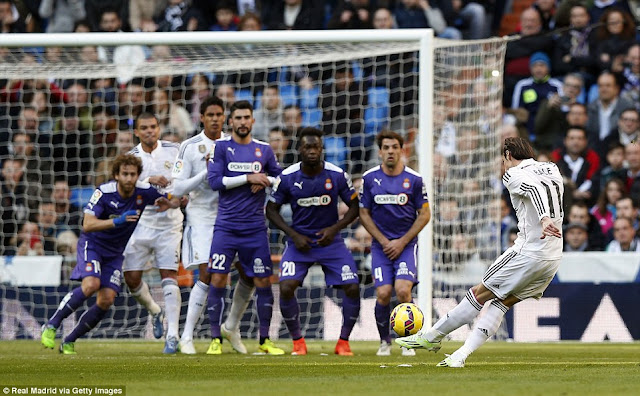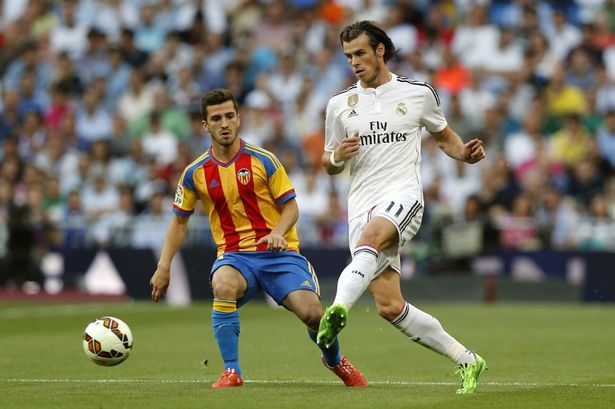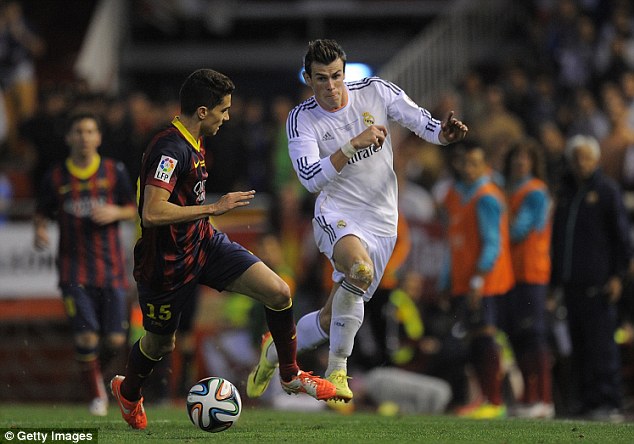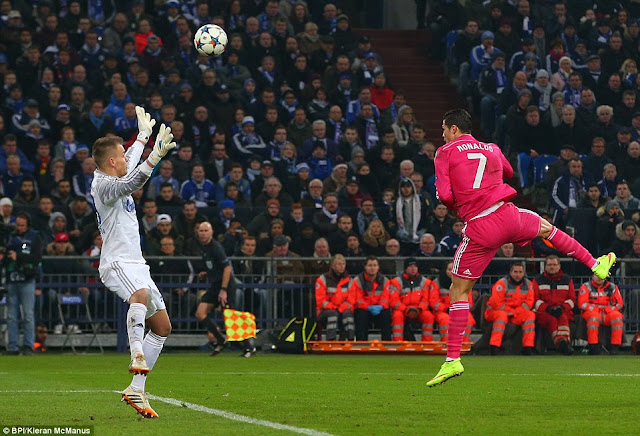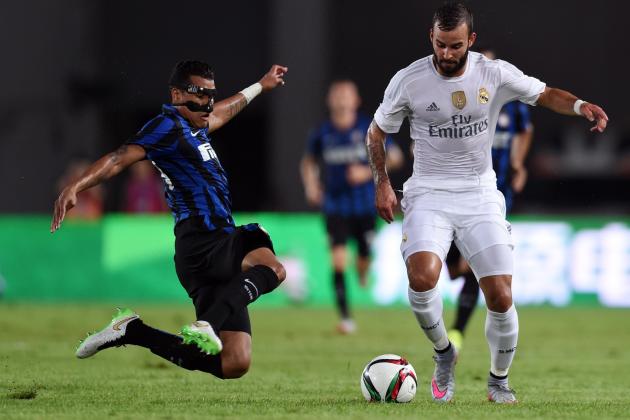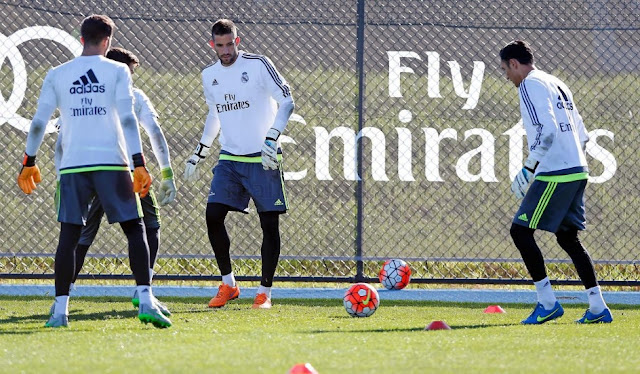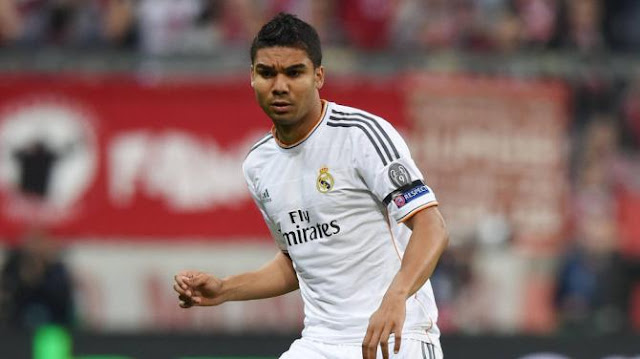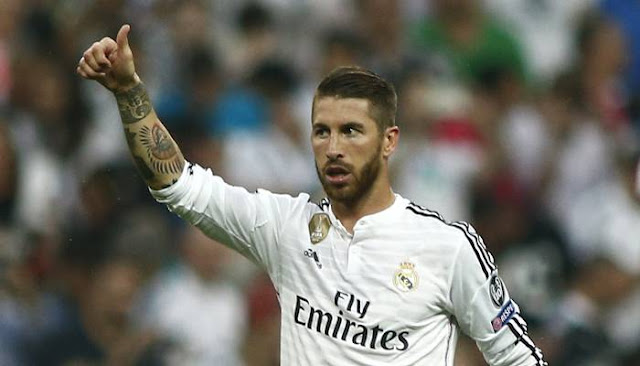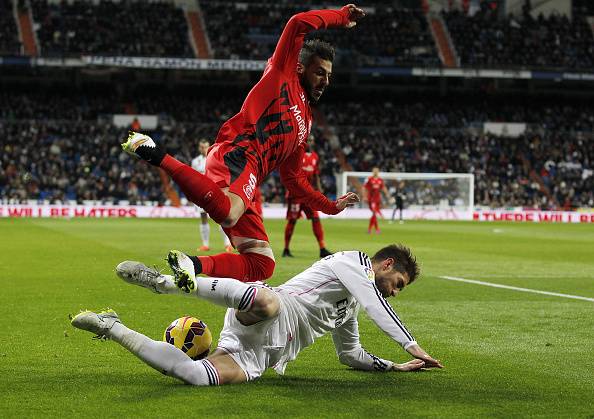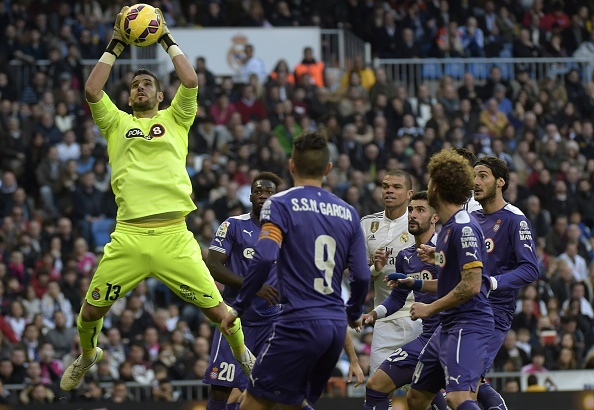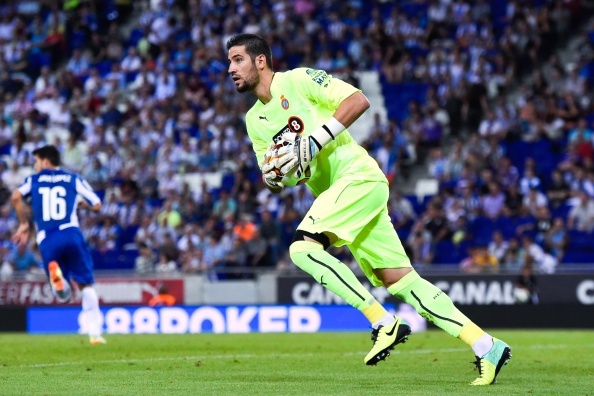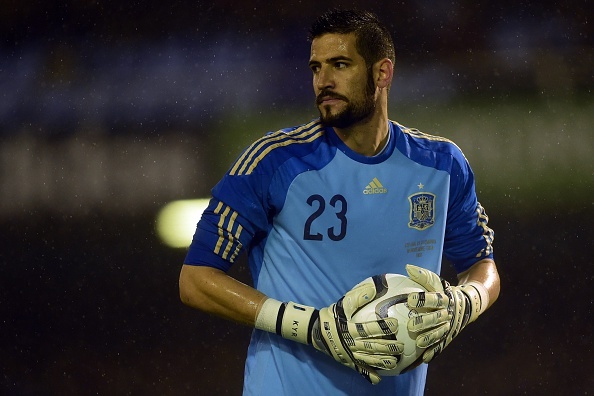 |
| Iker Casillas |
The communique via which Real Madrid formally announced that Iker Casillas, "our greatest keeper," was leaving for Porto came precisely five years to the minute after he and Spain began the half-hour of extra time against Holland that would win them the World Cup.
It's a remarkable quirk of fate but typical of "San Iker." Beyond all the trophies he's won, over and above his innate talent, he's undeniably one of these sportsmen to whom things "happen." From forgetting to post his family's pools coupon on a day when they'd have won big money, to being called out of a class in secondary school to travel to Norway with Real Madrid as reserve keeper in the Champions League aged only 16, there is something about this Madrilenothat magnetically draws "events" toward him.
When he wasn't first choice for Spain, his rival at the time, Santi Canizares, dropped his aftershave bottle and stood on the broken glass. Suddenly, Iker was tapped on the shoulder by the sporting gods such that the impending World Cup, Korea/Japan 2002, solidified him as La Roja's number one.
When this die-hard Madridista found a footballing soul mate, it just had to be an equally-talented Catalan and equally staunch Barcelona fan, Xavi Hernandez. Not quite love across the barricades and definitely not Romeo and Juliet, but the admiration which occasionally dared not speak its name.
When he was properly demoted from the first team for the first time in his career, by Vicente Del Bosque in 2002, it was just in time to be benched for the start of the Champions League final. Cesar Sanchez took his place. But, again, this is Iker. His career shows that it's not just him who influences the great events in his sporting life... things happen to him.
The 2002 final is at its tipping point: Madrid lead Bayer Leverkusen 2-1 but the Germans are fearfully strong and los Blancos are tiring, noticeably. Cesar then injures himself. Iker hasn't ripped the sleeves off his jersey as he habitually does (ritual, or superstition if you prefer, plays a firm part in his career) and he's caught frantically having Javier Minano, the fitness coach, hack off the cuffs of the keeper's top with scissors before Casillas races on to replace his teammate.
He looks ill-prepared; those moments before play restarts give the impression that fate has taken a turn against Madrid. Instead, the 20-year-old wins his second Champions League medal via a series of "defend the Alamo" blocks and saves that make him an all-time hero of the European Cup's most successful team.
But if Cesar hadn't injured himself... again, things happen to Iker. And it is for that reason, I suspect, that he's disliked by a few noisy, misguided, bitter souls and that there's a general tone of him being "undervalued."
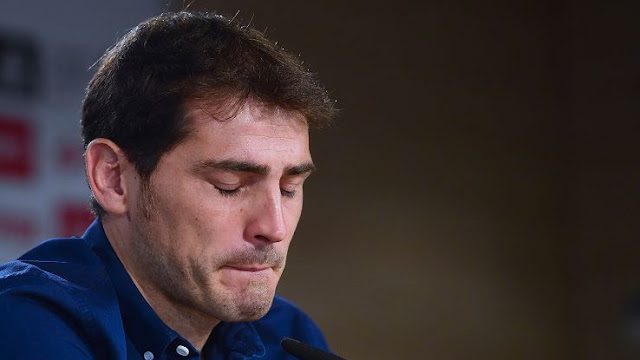 |
| Iker Casillas' time at Real is finally up, but the manner in which it ended won't change his status as a club legend. |
His nickname, "San Iker" ("Saint Iker") is meant to convey that he constantly rescued his club and country with mini-miracles. Yet it also left the impression that some who used it also intended it to mean that this guy had divine protection. That luck, and a privileged life, had simply landed in his lap.
Not so. Part of his greatness, and I declare him to be an all-time footballing great, is that he chooses to make things happen. He chooses his path, his character, his manner, his goalkeeping method, how he maintains his relationships -- for better or for worse. Casillas has never been a guy who just wanders through life whistling a happy tune, secure in the knowledge that he's been given saintly protection.
His all-time knack, no doubt, has been in one-on-one moments, either in open play or in the lottery of a penalty shoot-out. The spotlight seconds when everything rests on him, Iker shines through. A man who makes great split-second choices, a man unhurried and unworried by the world watching him, a man who will take responsibility. How many of them do you know in your life? Never mind in football.
So when it's the penalty shoot-out against Spain's bete-noire, Italy, in the 2008 European Championship quarterfinal, Iker doesn't want counsel. He doesn't want more stats or encouragement. His keeper coach, Jose Manuel Ochotorena, told me: "If you watch him in moments of high tension during a match you'll see that he can change in an instant from being completely normal to completely cold and calculating. He'll tell me that he's going to let his instincts, his sixth-sense take over and that he wants to be left alone."
Iker went out and grabbed history by the throat -- repeatedly. During his three winning Champions League finals, he conceded one goal -- albeit one that was a clanger and for which he felt he "wanted the pitch to open up and swallow him." No keeper has won more international matches than him, no keeper has kept more international clean sheets than him. Had you argued at the beginning of his career that a Spanish keeper might achieve these records, you'd have been laughed out of the house.
In the past six Champions League seasons, only Manuel Neuer has kept more clean sheets than Casillas (one more, at that). It's pretty phenomenal given that Madrid don't set out to be parsimonious at the back.
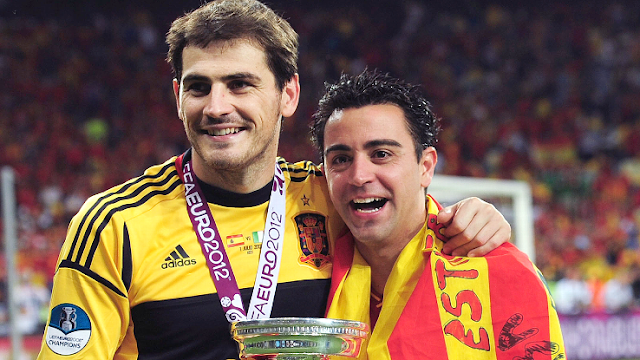 |
| Casillas and Xavi had a unique rapport that transcended the clasico though both men are now moving on. |
None of these things "happened" to Casillas; he made them happen. And long ago, Iker decided that he wanted to be himself, true to his nature. He has always, always argued that he'd like to be recalled as a "decent man" than as a great keeper, a theme he repeated on Sunday at the Bernabeu while he tearfully said goodbye to the assembled media and, via them, the greaterMadridista audience.
So when the time came, as captain of Madrid and captain of Spain, he felt it was time to speak out against the damage done by Jose Mourinho's "scorched earth" policy intended to destabilise Pep Guardiola's Barcelona, Casillas took action. The clasico wars had reached a level of viciousness, stoked by Mourinho, which was patently rupturing harmony in the Spain camp.
The easy course of action, one which others chose, was to show allegiance to the club flag, the one under which daily work was undertaken while swallowing personal objections and putting one's self-interest first. But Iker acted. After the Spanish Supercup battle of 2011 it was he, as Spain captain, who listened to (and heard) Vicente Del Bosque warning that if matters weren't addressed and corrected by the players he'd take measures himself.
Casillas phoned both Xavi and Carles Puyol, not to apologise for what Mourinho's edicts had brought to the clasico but to say "This has to stop ... we have to take mutual responsibility" and "No matter club differences, we have a European Championship to be won next summer." He took the grown-up route; the noble decision. The self-sacrificing one.
Mourinho disapproved. Little by little their relationship went from bountiful to frozen; increasingly, Mourinho's media friends aimed their poison darts at Real Madrid's captain until, ludicrously, Casillas was dropped for reserve keeper Antonio Adan in December 2012 when neither man's form merited the change.
Shortly afterward, Casillas was injured and suffered the longest absence of his career.
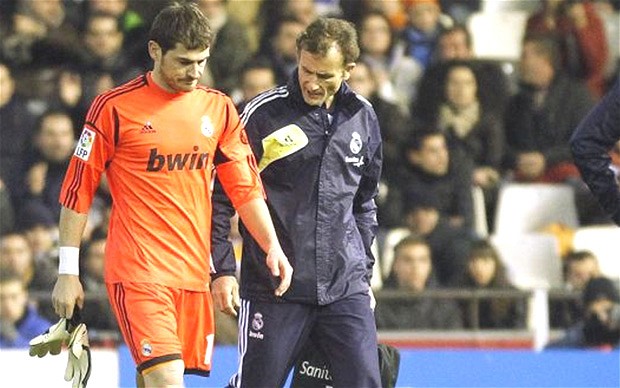 |
| Iker Casillas - Injured |
Some will now argue that he's been a lesser keeper ever since. Fine; his level hasn't been at its apogee. He's looked as if his confidence was badly rattled. For Spain still more than for Madrid, there has been a decline over the last two years. But which comes first? The chicken or the egg? At a time when he was going through major life changes -- a partner, a baby son, a long-running, fractious break-up of the management company which he and his parents ran -- Casillas suddenly found that his club coach was more foe than friend.
He admitted that he felt "isolated" like "the plague" and that he was shocked at how all of a sudden, there was a flood of articles "calling me a traitor or a dressing room leak."
It's worth noting that the only season of Mourinho's reign when Madrid won nothing was the season when Iker was both dropped and then injured. It's also worth noting that when he was given "only" the Copa and Champions League games by Carlo Ancelotti in his first season, Madrid won both the trophies in which Casillas played but lost the league during which he was benched.
I argue that during this most tumultuous time in his life, Casillas also set a record for clean sheets during those Cup and Champions League matches. Following Mourinho's choice to pull the carpet from underneath him, Casillas also won four more trophies for Madrid, keeping a clean sheet in two of those finals. But while Mourinho's choices were of course wrong-headed, created unnecessary sourness and ultimately proved ill-chosen, the very essence of Casillas' life and career choices added to the reasons for his coach turning away from him.
 |
| An emotional Iker Casillas made a statement saying goodbye to his fans in Madrid after 25 years and 19 trophies as he is heading to Porto. |
The 34-year-old is a "particular" player. For whatever reason, nature rather than nurture, he's someone who carries attitudes that are now almost from another era. Those who benefit from his skills accept that Iker does things his way. He'll choose to wrap himself in a bubble and get lost in his own thoughts sometimes -- he'll vest all his trust in his reactions and his instincts rather than modern, advanced training techniques.
It has meant that when things turn against him at a time when age needs to be fought just as hard as opponents and enemies do, Casillas has found that he has less to fall back on. The player who embraces modern thinking, modern techniques, who adapts and who realises that "things won't always be the way they are right now" is the one who'll weather stormy moments best. But as Paul Anka wrote and Francis Albert Sinatra sang, Casillas did it "his way."
Without question, this is something that taxed Mourinho, Ancelotti and their keeper trainers. As is the fact that Iker saw it as part of his captaincy role todiscutir (discuss, oppose and sometimes even fight) with Mourinho. That was Iker acting, not letting life fall into his lap, and if it has gradually destabilised him at Madrid, turning some against him, then more the fool them. But I bet you everything I own that he neither regrets it nor would do things differently if he had his career all over again.
 |
| Speculation about David De Gea replacing him at the Bernabeu is no longer an important point given Casillas' exit. |
It was only late May when Casillas was saying that "I can't conceive of myself at any other club next season." He said he welcomed the new broom of Rafa Benitez, that he was happy to compete with David De Gea should he be signed and reminding everyone that "I don't have some secret clause in my contract that I have to be number one while I'm at Madrid!"
Casillas intended to stay; he wanted to stay. And while his parents have done him absolutely no favours by hammering Florentino Perez in one of Spain's quality newspapers or by comparing Porto to a "third division" option for their son, it's clear that however you define 'forced out' that's how he feels. Like Del Bosque, Hierro, Morientes and Raul before him, another Madrid great has fallen to a signature Perez purge.
Madrid don't owe him a decision that he must stay; they are fully within their rights to turnover their squad and plan for a future beyond the 34-year-old keeper. He's a great but not automatically a part of this club's future, either in the short- or medium-term.
But where the club has failed in is in their treatment of him since the last days of 2012. There has been a lack of class, a lack of grace, a lack of appreciation and a tone of "bring him down a peg or two" -- even a sense of "payback." It's all very sad. Complacency and arrogance by those who have the fortune to employ sporting greatness often leads such lesser people to be envious, pompous and confident that there will be another "this guy" in a season or two.
Sport is littered with it. But in Iker's case, there most certainly won't. And while Iker's time to leave the club he helped make greater was always going to come along sooner than those who appreciate him would like, there was a way to wind down toward this moment. But not for the first time, Madrid failed to understand that or to choose it.
It's ironic that the club statement, written by a wordsmith rather than a decision-maker, finally shows the kind of affection, context, respect and recognition that this guy has long deserved -- albeit just when it's too late.
A part of that statement reads as follows:
"... today, the greatest goalkeeper in the history of the club and in the history of Spanish football is moving on to a new stage in his footballing career. This goodbye evokes thousands of sensations and memories charged with hope, anticipation, sacrifice, strength and unique triumph. Iker has made our coat of arms even greater. He's been our captain and forged his legend here since arriving at just 9 years old.
"Our club is 113 years old and Casillas has worn our shirt for 25 of them. During that time he's become one of our finest leaders and won the respect, affection, admiration and love of the fans. Iker is leaving but his legacy is here forever. His attitude and actions in the 725 games he played in our shirt shine a light on the path for those who dream of being a part of this team."
source: espnfc.com
Related Posts:
1. Casilla, Navas option with no De Gea
2. Strength and weakness of Kiko Casilla

